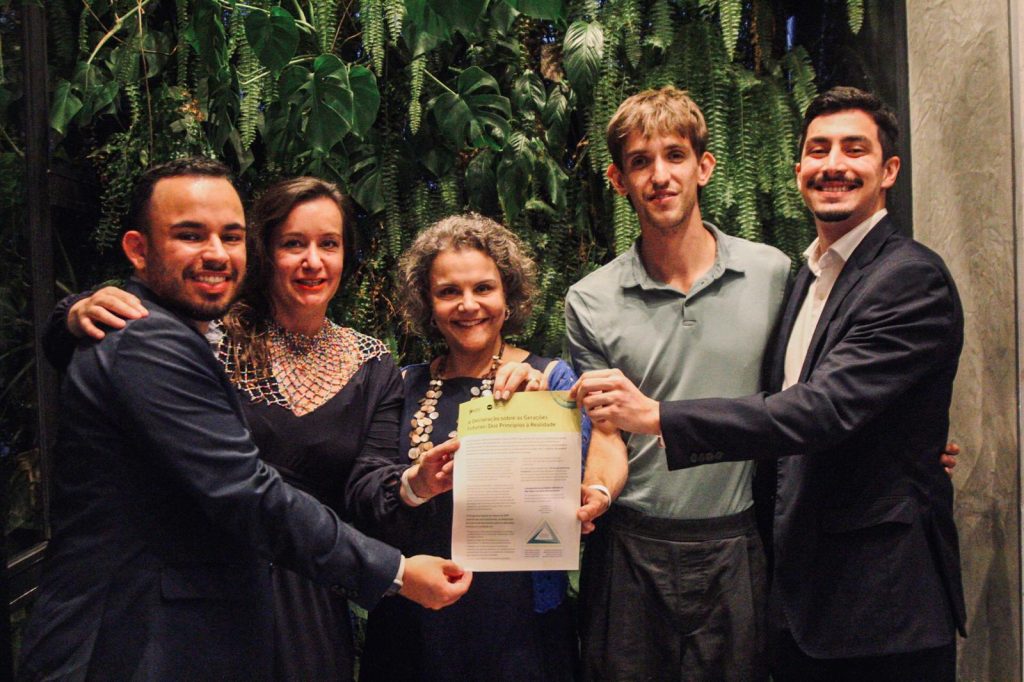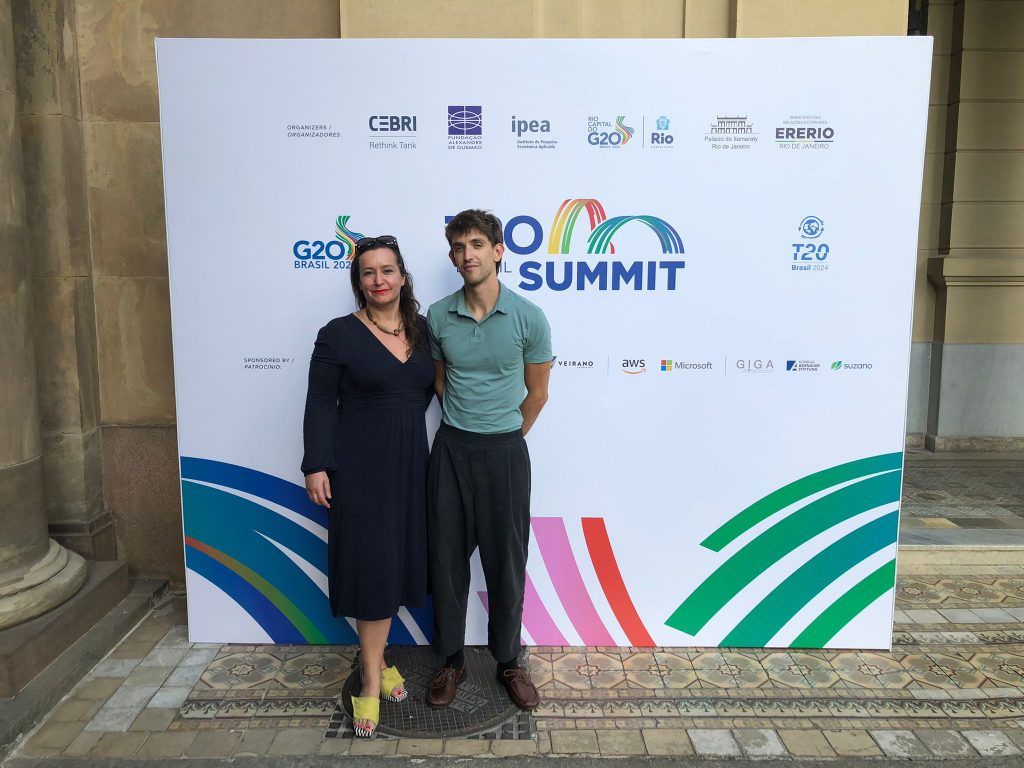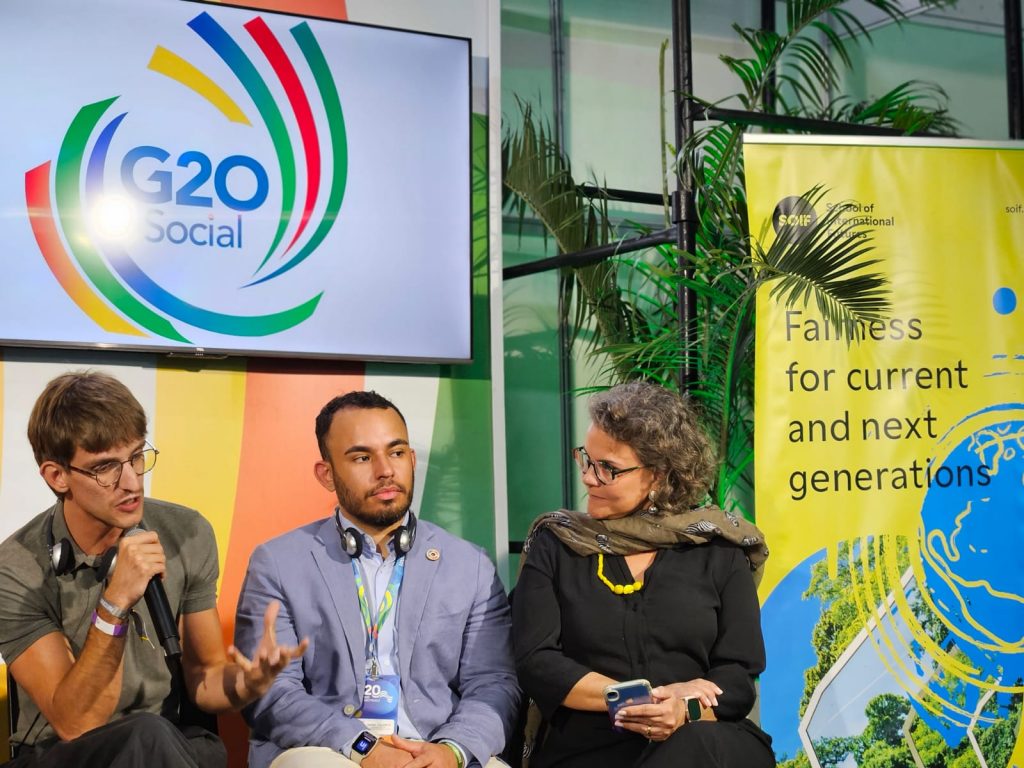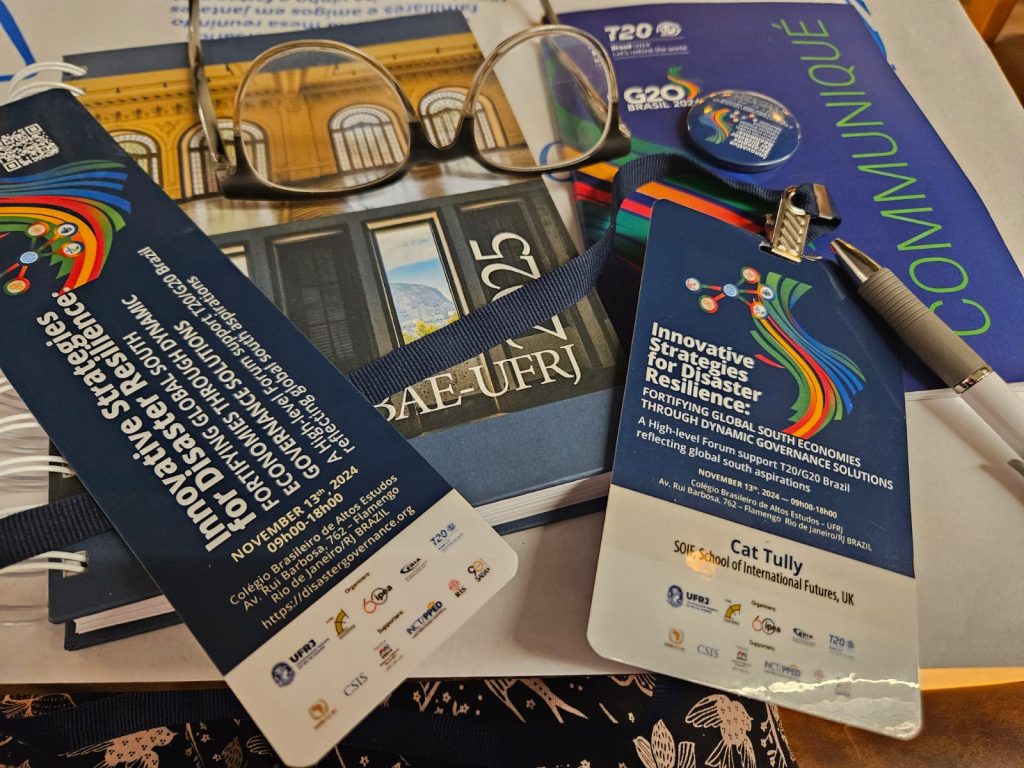
Against the background of global calls for financial and climate justice, the G20 remains a pivotal platform for fostering meaningful collaboration and actionable change. With Brazil leading the G20 in 2024, SOIF has been actively shaping a future-oriented agenda through the G20 Intergenerational Hub on Governance and Futures. This initiative is designed as a multilateral space to catalyse networks and pilot innovative approaches for implementing the Declaration on Future Generations (DFG).
The G20 Declaration: A commitment to future generations
The 2024 G20 Declaration reflects a historic commitment to addressing the challenges of today while safeguarding the interests of future generations. Leaders affirmed:
“The challenges the global community faces today can only be addressed through multilateral solutions for a better tomorrow and the strengthening of global governance for both present and future generations. In order to deliver on the promises of the United Nations and other relevant international organisations around the world, we pledge to work for a reinvigorated and strengthened multilateral system, rooted in the purposes and principles of the UN Charter and international law, with renewed institutions and a reformed governance that is more representative, effective, transparent, and accountable, reflecting the social, economic, and political realities of the 21st century.”
This declaration underscores the importance of reimagining governance structures to ensure inclusivity, equity, and the capability to address complex global challenges–from climate change to socioeconomic inequalities, including gender and racial discriminations.
Advancing future generations at the T20 Summit

As part of Brazil’s G20 presidency, SOIF collaborated with 15 international experts and organisations to produce a policy brief for the T20 Brasil 2024 process. Focussed on building high-ambition multilateral commitments, the brief outlines a holistic framework for evaluating effective long-term governance.
Key recommendations include:
- Advancing intergenerational fairness and solidarity. Ensuring policies serve both present and future generations.
- Building awareness of historical legacies. Reflecting on past decisions to guide equitable and sustainable governance.
- Aligning with Brazil 2024’s “Let’s Rethink the World” agenda. Bridging global governance priorities with innovative approaches to long-term policymaking.
This work draws heavily on insights from the Pledge Network and serves as a bridge between the outcomes of the Summit of the Future and G20 conversations. SOIF presented these ideas at the T20 Brasil 2024 Summit, contributing to Track 6 on strengthening multilateralism and global governance.
Key highlights from Brazil’s G20 presidency

As Brazil closes an ambitious mandate centred on global financial challenges, SOIF has supported transformative dialogues and initiatives with diverse local and global stakeholders. These efforts aim to ensure that the decisions made today take into account the livelihoods of tomorrow:
- Side events at the G20 Social Summit. Following a year-long work of advocacy and peer exchanges with local stakeholders, regional and global partners, SOIF co-hosted two side events: Bridging Global and National Governance for Future Generations and Participatory Foresight: Youth and Climate Adaptation. These events were delivered in partnership with key allies:
- Plataforma CIPÓ and the Institute for Economic Justice. As key Brazilian and South African actors from the T20 network, these organisations emphasised global governance reform discussions and explored ways to link these efforts to transforming governance at the national level.
- The Intergenerational Center for Global Action. An organisation born from the efforts of NGFP Network members, promoting meaningful intergenerational collaboration and action for renewed development and democratic models to emerge.
- Perifa Connection, Coletivo Utopia Negra, Instituto Procomum, and ALAF. Grounded in the lived realities of Brazil’s favelas, these organisations champion care, resilience, and racial equity. Their work highlights the transformative power of community-rooted futures initiatives, including efforts by the newly formed Associação Latina de Futuros (ALAF).
- The Wellbeing Economy Alliance and Green Economy Coalition. These organisations closely followed the discussions, sharing perspectives on reshaping international governance frameworks and measures to align with principles of sustainability and justice.
- Brazilian Alliance for Long-Term Governance. This alliance, coordinated by SOIF in partnership with Instituto Toriba and Observátorio Internacional da Juventude is an open and dynamic coalition driving systemic change within and beyond Brazil. Born from collaborative spaces like the Wales Forum for Future Generations and the SOIF retreat, the Alliance demonstrates the power of co-creation, bringing together a broad spectrum of actors, including policymakers, indigenous leaders, and youth climate negotiators. Key planned activities for next year include:
- Policy briefs
- Policy Pilots. Exploring participatory budgeting, foresight integration in Parliament and the Planning Ministry, and initiatives connecting indigenous futures across the three tropical basins.
- Amazon House at COP. A hub for indigenous futures and climate leadership, connecting local resilience with global strategies.
- Community-Driven Futures Work. Brazil’s vibrant futures community is rooted in the power of local collaboration and global networks. From the Manguinhos favela to global futures movements, these efforts illustrate the transformative potential of community-based initiatives.
- Tomorrowlands. In Manguinhos favela, economist Rodrigo Mendes and community leader Paloma da Silva Gomes are at the forefront of using foresight methodologies through their work with Tomorrowlands, a project piloting workshops to inspire young people to envision new futures.
- Afro-futurism synergies. At an informal community gathering hosted by the G20 Intergenerational Hub on Governance and Futures, Paloma invited a local educator working with students on Afro-futurism. Unaware that her creative work already aligned with current efforts, this educator’s connection with Rosa Alegria from Teach the Future sparked new synergies, weaving her efforts into the broader global movement for futures literacy.
- Network weaving in action. Multiple interactions during the Hub’s launch cocktail, dinner, and informal gathering created new opportunities to expand the scope of transformative action. These exchanges demonstrate the transformative power of network weaving, fostering collaborations and inspiring shared visions to build fairer systems for both current and future generations.
A bridge between the Summit of the Future and the G20
SOIF’s work at the G20 builds on the principles outlined in the Implementation Handbook for the UN Declaration on Future Generations, providing practical pathways for countries to operationalise the DFG. These efforts also align with the T20 Policy Brief, drawing on insights from the Futures Pioneers and Pledge Networks to advocate for intergenerational fairness, participatory governance, and long-term resilience.
Looking ahead

The G20 Intergenerational Hub on Governance and Futures and the Brazilian Alliance for Long-Term Governance are platforms designed to drive transformative collaboration. By piloting frameworks, nurturing alliances, and amplifying local voices, these set the stage for upcoming global moments—from South Africa’s G20 in 2025 to the UN World Social Summit in Qatar, the Financing for Development Summit in Spain, the BRICS Summit and COP30 in Brazil.
As the world faces pressing global challenges, these initiatives reflect a hopeful and determined approach to governance: one that bridges generations, uplifts communities, and reimagines the future.
If you’re interested in joining or learning more about these initiatives, please get in touch.
